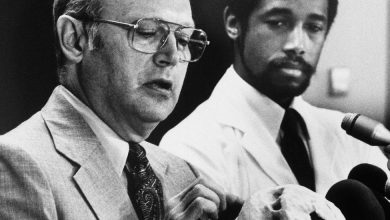Biden Campaigned as the Anti-Trump. But a Clean Break Is Never Easy.

WASHINGTON — President Biden has been so eager to move past the Trump era that he prefers to call his predecessor “the former guy” rather than utter his name.
But in recent weeks, Mr. Biden has found himself in the uncomfortable position of being compared over and over again to Donald J. Trump. Foreign policy experts and even some of his own allies have invoked the T-word on issues such as immigration, treatment of foreign allies and the abrupt withdrawal from Afghanistan.
The comparisons have prompted the White House to underscore points of contrast — its focus on climate, the end of dictating policy by Twitter — to push back on any sense that Mr. Biden represents something less than a clean break from the slash-and-burn politics of the past four years.
“I think we’re in a bit of a different place,” Jen Psaki, the White House press secretary, said at a briefing on Thursday when asked about recent comparisons. “People would be pretty hard-pressed to argue that the president has taken any aspect of the former president’s playbook and used it as a model of his own.”
In terms of tone and temperament, the two men are hardly alike. But Mr. Biden is finding that when it comes to policy, it is not always easy to draw a clear line separating himself from Mr. Trump.
Perhaps the most blunt comparison came this month, when Jean-Yves Le Drian, the French foreign minister, said he was livid at how the United States circumvented France to cut a deal with Australia to build nuclear-powered submarines.
“This brutal, unilateral and unpredictable decision reminds me a lot of what Mr. Trump used to do,” Mr. Le Drian said.
Derrick Johnson, the president of the N.A.A.C.P., last week referred to Mr. Trump in criticizing the Biden administration’s decision to turn back hundreds of Haitian migrants trying to enter the United States.
“If we were to close our eyes and this was occurring under the Trump administration, what would we do?” Mr. Johnson said, warning the administration that his group had no permanent friends, only permanent interests.
And in a scathing article in Foreign Affairs published this week, Richard Haass, the president of the Council on Foreign Relations, argued that there was “far more continuity between the foreign policy of the current president and that of the former president than is typically recognized.”
Part of Mr. Biden’s problem is that he is unable to simply wave a wand and unwind four years of policy. On immigration, for example, his efforts to enact lasting policy changes have been blocked by federal judges skeptical of executive power and slowed by a bureaucracy purposely hobbled by Mr. Trump.
But that has still left Mr. Biden open to criticism that his actions matter more than any anti-Trump language or intent.
“President Biden was and is criticizing the behavior of his predecessor, Mr. Trump, vis-à-vis Iran,” Hossein Amir Abdollahian, the Iranian foreign minister, told NBC News last week. “But at the same time, the volume of the file of sanctions that Mr. Trump built against Iran is being carried carefully by Mr. Biden.”
In his article, Mr. Haass faulted the Biden administration for taking an “America First” attitude toward fighting the coronavirus pandemic. “U.S. exports of vaccines were limited and delayed even as domestic supply far exceeded demand, and there has been only a modest effort to expand manufacturing capacity to allow for greater exports,” he wrote.
An official defended the administration, noting that after building the domestic stockpile, the United States donated 1.1. billion vaccines abroad, and that for every dose given to an American, the country donated three vaccines abroad.
Some foreign policy experts said that any points of similarity between the Biden and Trump agendas indicated less about the two leaders and more about continuing interests abroad, as well as a “pivot to Asia” that began during the Obama administration.
The Chinese and the Iranians have pointed out that Mr. Biden has yet to roll back Trump-era sanctions and tariffs.
“During the campaign, both sides have a political interest in magnifying their differences,” said Richard Fontaine, the chief executive of the Center for a New American Security. But in reality, both parties have embraced a more hard-line stance toward China and a move away from trade agreements like the Trans-Pacific Partnership.
Understand the Taliban Takeover in Afghanistan
Who are the Taliban? The Taliban arose in 1994 amid the turmoil that came after the withdrawal of Soviet forces from Afghanistan in 1989. They used brutal public punishments, including floggings, amputations and mass executions, to enforce their rules. Here’s more on their origin story and their record as rulers.
Who are the Taliban leaders? These are the top leaders of the Taliban, men who have spent years on the run, in hiding, in jail and dodging American drones. Little is known about them or how they plan to govern, including whether they will be as tolerant as they claim to be. One spokesman told The Times that the group wanted to forget its past, but that there would be some restrictions.
How did the Taliban gain control? See how the Taliban retook power in Afghanistan in a few months, and read about how their strategy enabled them to do so.
What happens to the women of Afghanistan? The last time the Taliban were in power, they barred women and girls from taking most jobs or going to school. Afghan women have made many gains since the Taliban were toppled, but now they fear that ground may be lost. Taliban officials are trying to reassure women that things will be different, but there are signs that, at least in some areas, they have begun to reimpose the old order.
What does their victory mean for terrorist groups? The United States invaded Afghanistan 20 years ago in response to terrorism, and many worry that Al Qaeda and other radical groups will again find safe haven there. On Aug. 26, deadly explosions outside Afghanistan’s main airport claimed by the Islamic State demonstrated that terrorists remain a threat.
How will this affect future U.S. policy in the region? Washington and the Taliban may spend years pulled between cooperation and conflict, Some of the key issues at hand include: how to cooperate against a mutual enemy, the Islamic State branch in the region, known as ISIS-K, and whether the U.S. should release $9.4 billion in Afghan government currency reserves that are frozen in the country.
“It’s not because Trump alone had seized the idea,” Mr. Fontaine said. “This is part of the new consensus across party lines in Washington. That was the case whether you were going to have Trump or Biden or Clinton or Cruz. The political mood has gone in the protectionist direction. You see that reflected in two successive administrations.”
On some issues, like ending the war in Afghanistan, Mr. Biden’s Trump-like intransigence stems less from a “never back down” personality and more from trusting his own experience, former colleagues said. Mr. Biden’s decades on the Senate Foreign Relations Committee gave him hardened views of some issues abroad that he has held for years, those people said, as well as a determination not to admit any error or brook any criticism.
“I recommended we keep 2,500 troops in Afghanistan,” Gen. Kenneth F. McKenzie Jr. testified in Congress on Tuesday. Mr. Biden, however, overruled the advice of his generals and never admitted any error in the chaotic U.S. exit.
“The idea, somehow, that there was a way to get out without chaos ensuing, I don’t know how that happens,” the president told the ABC News anchor George Stephanopoulos last month, in his first interview after the Taliban took control of Afghanistan.
Even if it were possible to cherry-pick points of similarity between Mr. Biden and Mr. Trump, administration officials said, one of the starkest differences between the two is their values.
Andrew Bates, a White House spokesman, pointed out that during the recent tensions with France, Mr. Biden tried to de-escalate the situation rather than exacerbate it.
“In a matter of days, through careful, high-level diplomacy and working in good faith, we addressed this respectfully and are on a good heading,” Mr. Bates said. “That says everything, and it’s antithetical to how the previous administration handled their constant disputes with strong allies.”
When it comes to immigration policies, officials noted that the goal was to build a humane system as opposed to using the issue to purposely sow discord. And Mr. Biden has given more emphasis to elevating democracy and human rights than his predecessor, who praised authoritarian leaders.
The president is planning a Summit for Democracy in December and has tried to re-engage with the Human Rights Council. “That doesn’t wipe away the irreducibly difficult choices that have to be made in terms of what do you do with friendly autocrats,” Mr. Fontaine said.





